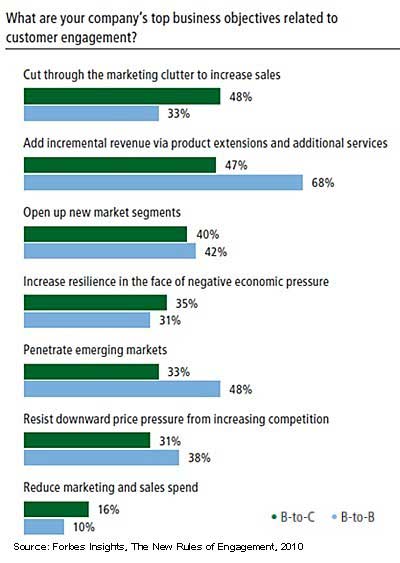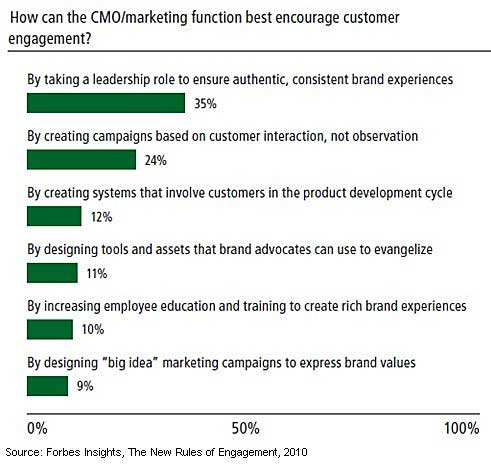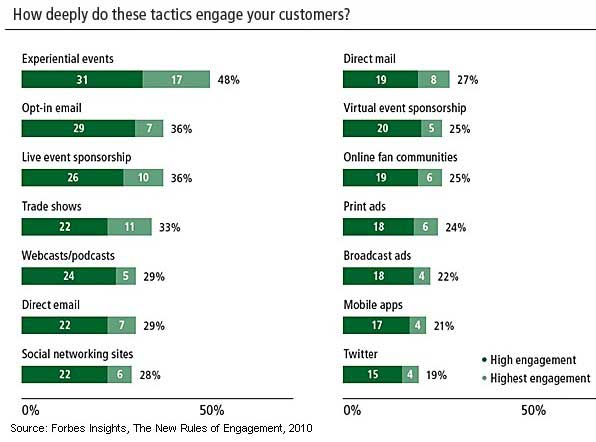As customers take a more active role in brand conversations, engagement is fast becoming a critical strategy and metric for marketers, but many CMOs and other senior marketing executives are struggling to formulate successful engagement strategies that have measurable impact, according to a survey from Forbes Insights.
Marketers clearly value engagement: 67% of surveyed senior marketers say customer engagement is very important in their company, and 86% say it is part of an ongoing conversation with the CEO, board of directors, and other corporate leadership. In addition, 69% of CMOs say their companies now have a defined strategy for customer engagement.
But just 10% say their companies are "excellent" at engaging customers, 59% rate their efforts as "good," and 30% say their efforts are "fair."
Below, other findings from the New Rules of Engagement: CMOs Rethink Their Marketing Mix, based on a survey of 314 CMOs and other senior marketing executives.
Defining Customer Engagement
Asked to define successful engagement, CMOs cite varying approaches:
- Repeat-purchase behavior: 72%
- Customers' becoming brand advocates: 69%
- Customers' willingness to pay a premium: 48%
- Customer resistance to competitive products and services: 28%
- Customer support for the brand reduces marketing and sales costs: 28%
Marketers' objectives toward customer engagement also vary:
- Among B2B marketers, adding incremental revenue by selling product extensions and additional services (68%) is the primary objective of customer engagement.
- B2C marketers—generally more sensitive to brand messaging—view engagement as a way to cut through marketing clutter to increase sales (48%).

Moreover, penetrating emerging markets is a solid objective in the B2B space (48%), but is less so among B2C marketers (31%).
Asked how the CMO/marketing function can best encourage customer engagement, CMOs cite the need to take a leadership role in ensuring authentic brand experiences (35%) and campaigns that generate tangible customer interactions (24%).

Another 12% cite involving customers in the product development cycle, and 11% cite designing tools to empower brand advocates.
Looking for great digital marketing data? MarketingProfs reviewed hundreds of research sources to create our most recent Digital Marketing Factbook (May 2010), a 296-page compilation of data and 254 charts, covering email marketing, social media, search engine marketing, e-commerce, and mobile marketing. Also check out The State of Social Media Marketing, a 240-page original research report from MarketingProfs.
Choosing Tactics
As traditional "interrupt and repeat" advertising models fade, customer conversations and advocacy engagement is taking center stage.
Among tactics designed to engage customers, experiential events tops the list with 48% of marketers rating it as having high/highest engagement. Opt-in email (36%) and live-event sponsorship (36%) follow in importance.

Social networking (28%) is now rated nearly equal to direct email (29%) in engaging customers, while other emerging tactics, such as mobile applications (21%) and Twitter (19%) trail.
Potential Roadblocks
Marketing execs say the top barriers to successful engagement are external factors, such as the economy (44%) and competition (42%), but they also cite internal issues:
- 30% say benefits to customers are not clearly articulated.
- 30% say they lack a well-defined approach.
- 28% cite negative customer experiences.
Measurement
Some 36% of CMOs say their company does not measure customer engagement.
Among the 59% who do measure engagement, customer retention is the top metric used (58%), followed by sales (44%), revenue per customer (35%), repeat purchases (33%), customer conversion (29%), marketing and sales cost (17%), campaign opt-in/downloads (15%), customer appetite for new products and services (11%), social media activity (10%), and length of sales cycle (5%).
About the data: Findings are from the Forbes Insights April 2010 survey of 314 marketing executives at businesses with annual revenues of $500+ million. Some 46% of respondents held titles of C-level executive (e.g., CEO, CMO), executive vice-president, or vice-president. The remaining 54% held the title of director of marketing.



